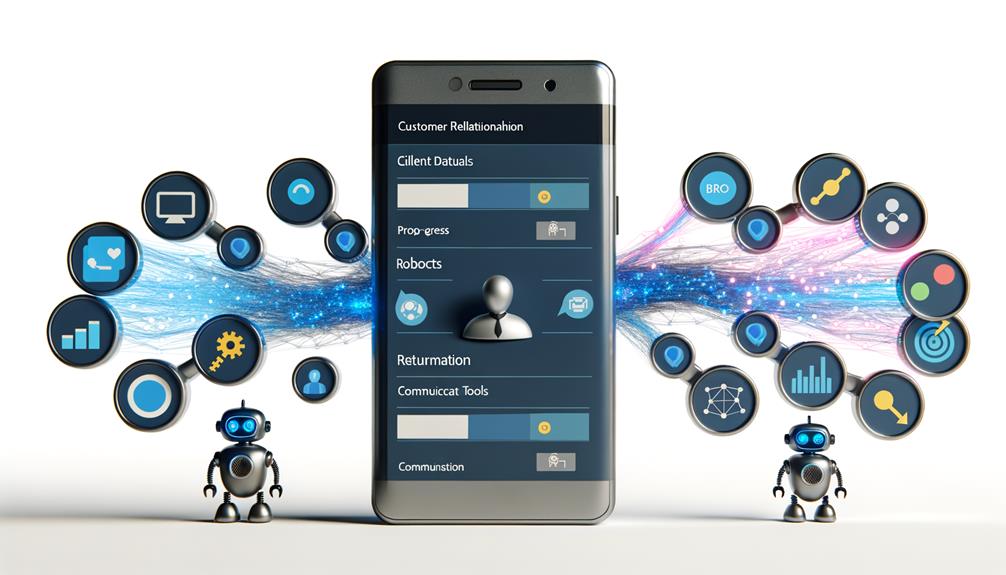Training AI models within CRM platforms is revolutionizing how businesses handle customer data. By leveraging machine learning, AI integration enhances personalization, shapes marketing strategies, and automates tasks, improving your bottom line. Essential steps include identifying necessary AI tools, grasping the integration process, defining business objectives, prepping quality data, and selecting appropriate technologies. Keep in mind, challenges such as data quality and security can arise. Address these early for a seamless integration. As you further explore, you'll discover how AI-powered CRM platforms, like Salesforce Einstein and Zoho CRM's Zia, are paving the way for future trends.
Understanding CRM and AI Integration

To fully understand how AI integration in CRM platforms revolutionizes business operations, you'll need to comprehend how it enables the training of models for personalized customer interactions, employs machine learning for analyzing customer data and behavior, and improves customer segmentation and marketing strategies. Through AI's predictive analytics, your CRM system becomes a powerhouse, automating routine tasks and enhancing your sales performance. It leverages customer data to generate insights, enabling you to anticipate customer needs and personalize your interactions. As a result, your marketing strategies become more targeted, making your business operations more efficient. Therefore, AI's integration into CRM platforms doesn't just streamline your operations, but also transforms your customer relations, leading to an unprecedented level of customer satisfaction.
Steps to Implement AI in CRM

Now, let's move on to the 'Steps to Implement AI in CRM'. It's important for you to identify the necessary AI tools and understand the CRM integration process. This stage involves determining your business objectives, preparing high-quality data for model training, choosing the relevant AI tools and algorithms, and subsequently monitoring and refining these models for best CRM performance.
Necessary AI Tools
In the journey of implementing AI in your CRM, you'll need to harness a range of essential tools, from popular AI training platforms like TensorFlow, PyTorch, and Scikit-learn, to model development tools such as IBM Watson, Amazon SageMaker, and Microsoft Azure ML. These tools are critical in the creation and optimization of AI models that can effectively analyze customer data and facilitate the use of machine learning algorithms in your CRM system.
- Data Preprocessing Tools: Pandas, NumPy, and Scikit-learn help in preparing historical customer data for model training in your AI-powered CRM software.
- Hyperparameter Tuning Tools: GridSearchCV and RandomizedSearchCV optimize AI models for better performance.
- Evaluation Tools: Confusion matrices, ROC curves, and precision-recall curves are used to assess model performance.
- Predictive Analytics Tools: These CRM tools utilize AI models to forecast trends and customer behavior.
CRM Integration Process
Starting the CRM integration process, you'll first need to accurately identify your business objectives for AI implementation, ensuring a clear pathway for the subsequent steps of data gathering, tool selection, algorithm training, and continuous refinement. Next, you'll commence on data preparation, essential in training algorithms. This involves gathering relevant customer data that your AI models will learn from.
Here is a table to guide you:
| Steps | Involves | Key to Success |
|---|---|---|
| Data Gathering | Collecting customer data | Accuracy and relevance |
| Tool Selection | Choosing appropriate AI technologies | Suitability to CRM system |
| Algorithm Training | Training AI models using data | Correctness of data |
| Refinement | Continuous monitoring and adjustment | Timely updates and checks |
Improving CRM With AI Models

With AI integration in CRM, you can enhance your business operations, offering more personalized customer interactions and improved insights. The utilization of AI models in CRM amplifies your predictive analytics capabilities, thereby strengthening your data-driven decision-making process. Additionally, AI's automation potential can streamline your sales process, not only saving time, but also increasing efficiency and accuracy in tasks like sales forecasting and lead scoring.
AI Integration in CRM
By integrating AI into your CRM platform, you're not only enhancing customer data analysis through machine learning algorithms but also improving the accuracy of lead scoring for targeted sales efforts. These AI models allow businesses to streamline sales processes, making your CRM system a more powerful tool.
Let's break this down:
- AI in CRM improves data analysis by training AI models on customer data, offering detailed insights.
- AI helps improve sales by increasing the accuracy of lead scoring, helping businesses target their efforts efficiently.
- AI optimizes resource allocation in your CRM system, automating routine tasks and increasing overall productivity.
- Lastly, AI enhances predictive analytics within CRM software, allowing for accurate trend forecasting and strategic decision-making.
Enhancing Business Operations
Incorporating AI models into your CRM platform doesn't just enhance data analysis and lead scoring – it fundamentally transforms your business operations. By training AI models within your CRM systems, you can improve lead scoring accuracy up to 10%, enabling precise customer segmentation for targeted marketing strategies. This integration has the potential to skyrocket your sales efficiency by predicting customer behavior with 95% accuracy. Furthermore, the optimization of resource allocation becomes feasible when AI is utilized, leading to maximized productivity. To conclude, AI-powered CRM platforms can greatly impact your customer retention rates, with an increase of up to 15%. Integrating AI models into CRM platforms redefines business operations, paving the way for more efficient and effective processes.
Predictive Analytics Advantages
Harnessing the power of predictive analytics in your CRM platform can revolutionize decision-making in your business, providing invaluable insights into customer preferences, buying patterns, and future behavior trends.
- Improved Decision-Making: AI models enhance your CRM system's capacity to analyze customer behavior, giving a clearer picture of their preferences and buying patterns.
- Accurate Lead Scoring: Training AI models within your CRM systems improves lead scoring accuracy, thereby boosting your sales team's efficiency.
- Predicting Churn Rates: AI models can predict customer churn rates based on historical data, allowing for the implementation of effective retention strategies.
- Optimized Marketing Campaigns: Leveraging predictive analytics enables you to personalize interactions, helping to optimize your marketing campaigns.
AI Applications in CRM

Frequently, you'll find AI applications in CRM like predictive analytics, which accurately forecast customer behavior, enhancing both sales outcomes and customer experience. Machine learning, another key application, evaluates leads and predicts sales, facilitating data-driven decision-making. NLP-driven personalization is a unique AI feature, segmenting customers based on behavior and preferences to optimize marketing efforts.
Moreover, AI assists in customer journey mapping, a product of effective customer segmentation. This process provides a detailed understanding of customers' interactions across various touchpoints, enhancing business strategies. Lastly, conversational AI plays a pivotal role in CRM platforms. It enhances customer experience by providing personalized and timely responses. All these AI applications in CRM are transforming how businesses understand and interact with their customers, leading to more proactive and personalized experiences.
Benefits of AI-Powered CRM

Leveraging AI in your CRM system doesn't just streamline operations, it transforms them, offering a treasure trove of benefits from predictive analytics improving customer relationships to AI-driven chatbots enabling personalized interactions. Here are four compelling advantages of integrating AI and CRM:
- Predictive Analytics: AI-powered CRM uses data analytics to anticipate customer needs, helping improve customer satisfaction.
- Personalized Interactions: AI-driven chatbots facilitate personalized customer interactions, enhancing CRM automation.
- Effective Lead Evaluation: AI aids in evaluating and prioritizing leads, thereby boosting conversion rates.
- Resource Optimization: By automating tasks, AI reduces manual labor costs in CRM operations.
In essence, training AI models within your CRM platform offers a strategic edge, future-proofing your business by staying ahead in technology and customer management.
Addressing Challenges in AI-CRM Integration

Given the myriad benefits of integrating AI into your CRM platform, addressing the inherent challenges is crucial. Data quality issues may impair model accuracy while security and privacy concerns arise when handling sensitive customer data.
| Challenges | Impact | Solutions |
|---|---|---|
| Data Quality | Impairs model accuracy | Improve data collection and processing methods |
| Legacy System Integration | Hinders successful integration | Update or replace outdated systems |
| Security Concerns | Risk to sensitive customer data | Implement robust security measures |
| Skills Gap | Lack of AI expertise | Invest in training and hiring AI-competent personnel |
Implementation costs and the skills gap in AI expertise can hinder the successful integration of AI into your CRM. By tackling these challenges, you can ensure a more efficient and secure AI-CRM integration.
Case Studies of AI in CRM

To explore the real-world application of AI in CRM, let's investigate a few notable case studies of AI in CRM such as Salesforce Einstein GPT, HubSpot's ChatSpot, and Zoho CRM's Zia.
- Salesforce Einstein GPT: This AI-powered solution contributes to AI-based marketing and sales in CRM, enhancing interactions and target precision.
- HubSpot's ChatSpot: Integrated with GPT-4, HubSpot CRM, DALLE-2, and Google Docs, this AI assistant streamlines sales and marketing operations.
- Zoho CRM's Zia: Zia takes CRM a notch higher by providing AI-driven personalized interactions, improving customer experience.
- Salesforce AI Cloud: Powered by Einstein GPT, this offers advanced CRM capabilities, showcasing the potential of AI in transforming CRM operations.
These cases illustrate how AI can revolutionize CRM, offering sophisticated, streamlined, and efficient solutions.
Future Trends in AI and CRM

Building on the innovative case studies of AI in CRM, we're now seeing a surge of future developments that could redefine how we manage customer relationships. By 2023, it's expected that 79% of enterprises will adopt AI-based CRM solutions. These advanced systems, leveraging machine learning and NLP, aim to provide personalized communications, enhancing customer interactions. They'll optimize resources, improve customer engagement, and facilitate data-driven decisions. Future trends indicate a shift towards advanced predictive analytics and enhanced customer journey mapping. You'll see more AI-powered virtual assistants, improving customer service. The potential here is immense; AI can revolutionize CRM by predicting trends, automating tasks, and personalizing interactions. As we move forward, these technological advancements will continue to shape the landscape of customer relationship management.



